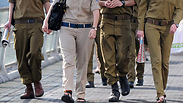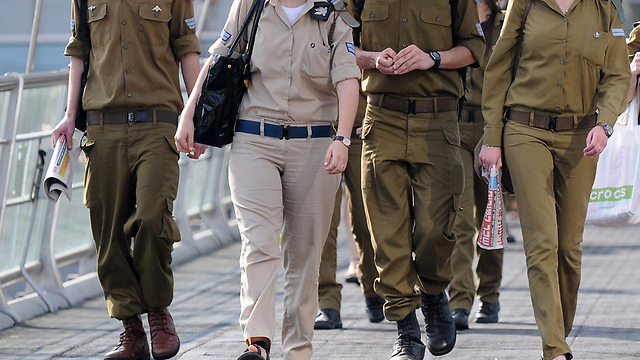
IDF urged to cease mandatory information seminars for non-Jews
Despite rights groups telling the IDF that its policy of instructing non-Jewish soldiers to attend information seminars about the fast-track ‘Nativ’ conversion course ‘encroaches on their privacy, sends a humiliating and degrading message that they are B-class citizens and inferior soldiers,’ IDF defends the policy, insisting ‘there is no intention to impose a religion,’ but rather to raise awareness for interested soldiers.
Each year more than 1,500 people convert to Judaism during their military service in the IDF in a fast-track course known as “Nativ.”
According to Orthodox Judaism, the individual undergoing the process must do so out of a sincere and pure desire to convert to Judaism of his or her own volition and free of any ulterior motives or pressures.
But the IDF, it turns out, obligates its non-Jewish soldiers to at least participate in seminars and conferences about the Nativ course, and many of those participating have claimed that pressure is indeed exerted on them, at both a command and social level, to enroll on the course itself.
“I went to the course following incessant pressure. I didn’t want to but I felt as though I had no choice,” explained Yael, who is shortly to be discharged from the army.
“I need to be like everyone else, and they make you feel bad if you don’t go. During the course I suffered and felt humiliated,” she continued. “Just as they don’t ask Druze or Christians in the IDF to convert, there is no reason to exert pressure on me. It isn’t ok.”
Proof of such coercion can be seen in a letter that was exposed for the first time to Ynet, that was sent from the IDF Education Corps to non-Jewish soldiers instructing them to enroll on the Nativ course.
Failure to attend seminars, which will place in Jerusalem in two parts during the month of June, could be considered for the non-Jewish soldiers—especially Christians or those who officially consider themselves as non-religious—as insubordination.
A letter sent by the Head of the Education and Immigration Section Captain Shani Zaruk contained the instructions regarding the non-Jewish soldiers.
“All soldiers are obligated to appear at one of the two seminars. The seminar will include registration and information … A soldier will not be given the chance to choose the day of the course or its character (whether he remains on base or returns home each day). This is a subject for the consideration by the Education and Immigration Section,” the directive reads.
Eighty per cent of Israelis who convert each year are women. The reason for this disproportionately high figure, and one which is seldom discussed, pertains to “prevention of assimilation.”
According to Jewish law, a child can only be considered Jewish providing that his or her mother is either Jewish by birth or has converted. In the event that a child is born to a Jewish mother and a non-Jewish father, it is still considered Jewish, meaning that non-Jewish men have no reason to be concerned about the religion of their child if born to a Jewish mother.
By contrast, if a woman is not Jewish, regardless of the religion of her partner or spouse, the baby is not considered Jewish.
Ya'ana immigrated to Israel 15 years ago. After being drafted into the IDF, she claims, she was pressured into attending one of the seminars.
“At a certain point my commander told me to enter his office. It turned out that he had received a mail containing the details of non-Jewish soldiers he had to send to the seminar. He gave me the details and said I had to go to Jerusalem. It was mandatory. Full stop,” she recalled.
Instructed to go whether she agreed or not, Ya’ana attended the seminar in Jerusalem. Only at its conclusion was she permitted to sign a waiver stating that she did not want to enroll on the course itself.
The IDF readily admits that participation in the seminar is obligatory, insisting that it exposes the soldiers to the conversion course who may otherwise never be made familiar with the option. However, it maintains that the ultimate decision to convert or not rests solely with the soldier.
The emphasis placed on demanding that non-Jewish soldiers attend the seminar is nothing new. In fact, it has been common practice for the past two years.
With may of the soldiers wondering why their personal beliefs are the subject of IDF interest, the Association for Civil Rights in Israel sent a letter to the army demanding that the practice be terminated.
“The IDF’s longstanding policy of forcing non-Jewish soldiers to go and hear information at the conversion seminar about the course encroaches on their privacy, ignores their rights to freedom of religion and conscience and sends a humiliating and degrading message that they are B-class citizens and inferior soldiers,” the letter said.
Nevertheless, officials from the IDF’s Education Corps insisted that there was no alternative to obliging the soldiers to participate in the seminars since without them, it is doubtful that people who may wish to convert would be made aware of the course’s existence.
“Everything is done with good intentions and there is no intention to impose a religion,” the IDF responded. “To be sure, the military conversion track is known to be considerate and moderate, which is why it has attracted criticism and opposition in Orthodox circles.”
The IDF Spokesperson’s Unit also intervened, issuing a statement responding to the outcry and defending the practice.
“The Nativ program was instituted with the aim of strengthening the sense of belonging of the immigrant soldiers and their children to the State of Israel and the IDF,” the statement began.
“The program allows soldiers who are not defined as Jews according to Halacha (Jewish law) to undergo a conversion course that is recognized by the State of Israel during their military service,” it continued.
“The soldiers who meet the criteria are invited to attend an information conference about the course, which the soldier is obligated to attend so that he has the ability to make an informed decision regarding his desire to participate in the program.
“A soldier who chooses to sign a waiver at the end of the conference will not be invited to another seminar and the process as it relates to him will cease. In the event that the soldier chose to participate in the program and then wishes to leave, he has the right to do so at all times.”



















